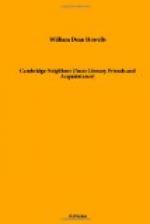V.
The Goethean face and figure of Louis Agassiz were in those days to be seen in the shady walks of Cambridge to which for me they lent a Weimarish quality, in the degree that in Weimar itself a few years ago, I felt a quality of Cambridge. Agassiz, of course, was Swiss and Latin, and not Teutonic, but he was of the Continental European civilization, and was widely different from the other Cambridge men in everything but love of the place. “He is always an Europaen,” said Lowell one day, in distinguishing concerning him; and for any one who had tasted the flavor of the life beyond the ocean and the channel, this had its charm. Yet he was extremely fond of his adoptive compatriots, and no alien born had a truer or tenderer sense of New England character. I have an idea that no one else of his day could have got so much money for science out of the General Court of Massachusetts; and I have heard him speak with the wisest and warmest appreciation of the hard material from which he was able to extract this treasure. The legislators who voted appropriations for his Museum and his other scientific objects were not usually lawyers or professional men, with the perspectives of a liberal education, but were hard-fisted farmers, who had a grip of the State’s money as if it were their own, and yet gave it with intelligent munificence. They understood that he did not want it for himself, and had no interested aim in getting it; they knew that, as he once said, he had no time to make money, and wished to use it solely for the advancement of learning; and with this understanding they were ready, to help him generously. He compared their liberality with that of kings and princes, when these patronized science, with a recognition of the superior plebeian generosity. It was on the veranda of his summer house at Nahant, while he lay in the hammock, talking of this, that I heard him refer also to the offer which Napoleon III. had made him, inviting him upon certain splendid conditions to come to Paris after he had established himself in Cambridge. He said that he had not come to America without going over every such possibility in his own mind, and deciding beforehand against it. He was a republican, by nationality and by preference, and was entirely satisfied with his position and environment in New England.
Outside of his scientific circle in Cambridge he was more friends with Longfellow than with any one else, I believe, and Longfellow told me how, after the doctors had condemned Agassiz to inaction, on account of his failing health he had broken down in his friend’s study, and wept like an ‘Europaer’, and lamented, “I shall never finish my work!” Some papers which he had begun to write for the Magazine, in contravention of the Darwinian theory, or part of it, which it is known Agassiz did not accept, remained part of the work which he never finished. After his death, I wished Professor Jeffries Wyman to write




